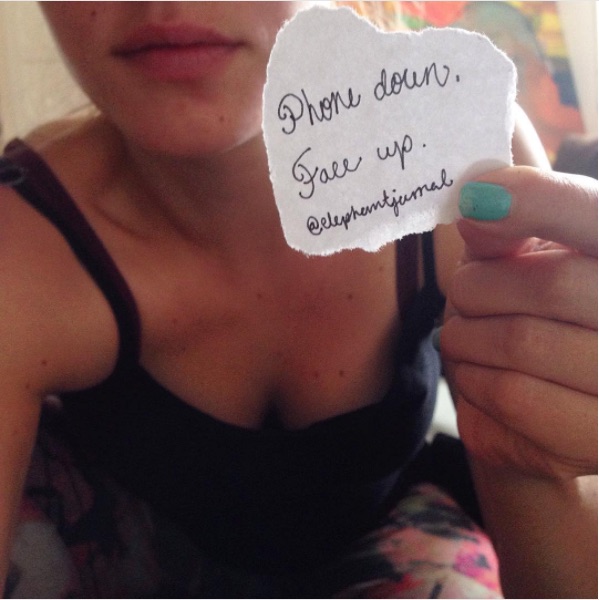“It’s not that I’m not okay…” my co-worker justifies as she wipes the tears from her eyes.
“My friends are just sending me messages and I get overwhelmed sometimes.”
My heart sinks. Not only because I’ve spent the last week hiding behind airplane mode, only to be bombarded with messages upon my “return to reality,” but because she and I both have trained ourselves to deny our feelings of overwhelm on the grounds that this is just the way things are.
It is long overdue to say: technology is not a replacement for authentic connection or relationships. And it was both relieving and upsetting to see that I’m not the only one resisting the pull to make virtual communication the new normal.
Just because we were born into this millennial tribe doesn’t mean we need to abide by the rules we’ve created.
And if we’ve created them, can’t we change them? My age shouldn’t suggest compliance to unspoken social agreements. I never signed on to be hit by constant requests and offerings and conversations. And if I don’t want to be a part of it, it shouldn’t feel so shameful to have to cut out forms of social media, as if to suggest it’s my problem, that I’m the one who can’t keep up.
I’ve been spending my young-adult years craving silence and shaming myself for my simple, contemplative lifestyle because I feel like “it’s not normal” based on what we’ve collectively decided.
Among this population, there are still the old souls, introverts, the care-takers, the “highly-sensitive,” the empaths, healers, intuitives, and many others who have yet to find their place in this already demanding world.
For many of these folks, social media becomes a catch-22 in the way that virtual socializing can also be cathartic. It relieves pressure from having to connect in person, sometimes. There’s a safety behind the screen and an ability to interact contemplatively as a self-care tactic. In doing so, however, we make ourselves available to receiving endless responses and open doors to communication we cannot protect ourselves from. It’s confusing trying to establish personal boundaries with a system that acts and functions beyond our control.
Being contacted unwillingly and often can feel victimizing, but we have learned to put ourselves in the space of receiving that contact.
The question in those moments becomes, what are we needing? Are we trying to engage with the world (looking at news, commenting on random posts)? With people we know? With ourselves and our own mindful process? Once we have the answer, how can we limit our interaction so we can have just that need met?
Let’s say it again: it is not normal to be accessible 24/7. Even if we are “online,” that does not mean we are “available.” There should not be pressure to respond. There should not be hard feelings if we can’t. It should not feel like there are repercussions to seeking silence or having to justify going MIA with endless apologies, excuses, and self-shaming stories.
Technology is incredible, but that doesn’t mean we have to utilize it every waking (and often non-waking) moment.
This is no longer just a conversation about bad posture from hunching over a computer, or not watching where you’re going because you’re staring at a screen.
This is a conversation about how people are being emotionally debilitated by the social norms that expect folks to be in touch at all times.
All aspects of interpersonal relationships are at stake here: boundaries, a sense of “self” versus “other,” effective communication, and connection. It compromises truth and authenticity. It destroys any potential remains of chivalry, of casual, spontaneous hang-outs, drop-ins, and quick hellos made at your front door. (Remember those? Wouldn’t that be nice?) That’s unheard of, now.
It feels like a part of history has died with the birth of this rapid, constant, urgent form of contact. It can feel forceful and disorienting. Entire jobs are built on our ability to network, navigate, and build social media platforms.
For the people out there who don’t feel equipped to handle it, I’m so with you. I am on my knees, surrendering with you. Crying with you. Bed-ridden, with you. Waiting for the noise to stop. The storm to calm. This isn’t a complaint or a wish to be without the blessings these resources have given us. It’s just a request and a plea for mindful and respectful consideration.
We need a pause. And it requires a mutual effort and conscious intention from all of us.
Talk to one another about your love language preferences. Set boundaries. That may look like telling certain people to only contact you during specific hours, or in case of emergency, or to call instead of text, or text instead of call.
This effective communication (preferably done in person) is the best bet we have at broadening our empathy and compassion as a collective.
I’m tired of myself and others feeling like we’re flawed or forced into silent suffering because we can’t handle this foreign and strange form of contemporary connection.
From this millennial to you and yours, I do not identify with many of the norms we’ve built. I take it upon myself to help others in the same boat stay afloat among them all. Maybe we could even sail together some day, preferably leaving our phones behind.
Author: Paige Leigh
Image: @elephantjournal
Editor: Emily Bartran
Copy Editor: Nicole Cameron
Social Editor: Leah Sugerman











Read 4 comments and reply